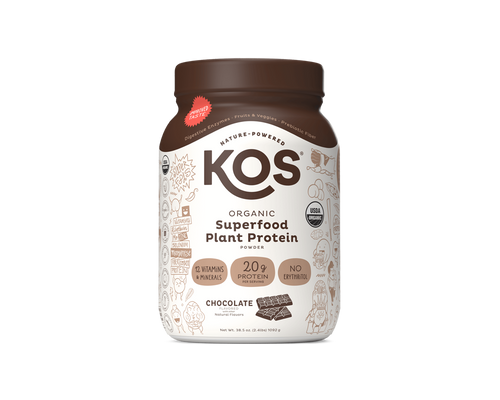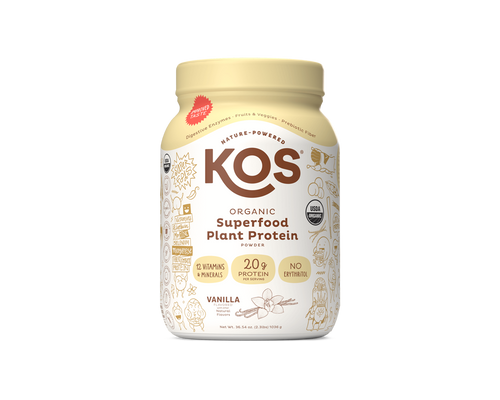Table of Contents
The Benefits of Plant-Based Protein Powder
Protein powder is a great option to support your health and fitness goals. It can of course be used in smoothies to support weight loss and to boost muscle gain in the gym. You can even throw the stuff into a baking recipe. There are a variety of benefits to adding plant-based protein powder to your diet.
Vegan protein powder promises to revolutionize the protein powder phenomenon, and is already gaining traction with powdered protein users increasingly aware of the many benefits of a protein product that does not come from the meat industry.
Vegan protein powders are naturally dairy-free, and many of them are organic, as well. They are typically made of brown rice, hemp, soy, chia seeds, or pea protein and taste great when added to smoothies or coffee. Vegan protein powder and plant-based protein powder can benefit both your health and—in a major way—the environment around you.

Protein Powder: A Quick History
In the 1940's, Paul Bragg (whose Bragg Apple Cider Vinegar would later make him famous) suggested to his friend Bob Hoffman that he should look into expanding his offerings into nutrition, specifically protein. Hoffman had founded and was doing well with the York Barbell Company, but his friend Bragg (not unreasonably) told Hoffman that people will rebuy weight training-related nutrition more often than they will need to purchase a new barbell.
Hoffman was skeptical, though he had indeed written and published a book, "Better Nutrition for the Strength and Health Seeker". But Hoffman didn't think protein itself was the issue, and his book simply reinforced a completist, healthy diet.
A decade later, though, Hoffman had added to his barbell empire a magazine called Hoffman’s Strength & Health magazine, and in its pages he sold a concoction called “Johnson’s Hi-Protein Food”. The inventor was a guy named Irvin Johnson. He ran a gym in Chicago, and in 1950 he published an article entitled “Build Bigger Biceps Faster with Food Supplements”.
Johnson had seen a business opportunity, but was not himself enthralled by the mixture he'd invented -- which was made from kelp, wheat germ, and soybeans. At that time, protein for the weight lifter was not considered as much a factor as a balanced diet.
But Hoffman saw something different, and in '52 began marketing his own supplement, which he called "Bob Hoffman’s Hi-Proteen Food". Yes, that was the spelling. When legendary fitness and body sculpting innovator Joe Weider jumped in with his own "Hi-Protein Muscle Building Supplement", the market for these product blew up, the weight training community jumping aboard as the benefits of a protein supplement became increasingly obvious and explained by clinicians and dieticians. The protein supplement industry was off and running.
Are Some Protein Powders Organic?
Protein powders that are certifiably organic will bear the USDA Organic seal on the packaging. USDA-certified organics are produced and handled according to strict federal standards. Soil quality, animal husbandry methods, pest and weed management, and the use of chemicals are all covered by these standards.
In the extreme, organic producers use natural elements and physical, mechanical, or biological farming processes to do the work that would normally be done by pesticides.
Produce has to have developed in soil that had contained no prohibited substances for three years prior to harvest. Most synthetic fertilizers and insecticides are prohibited. When a producer has no choice but to use a synthetic material to meet production goals, the material must first be authorized according to criteria that thoroughly evaluate its impacts on human health and the environment.
Benefits of Vegan Protein Powder
A vegan protein powder or protein supplement can be a great way to add essential amino acids to your diet, while supporting protein synthesis and muscle growth and repair in the gym. Different types of vegan protein powder can provide benefits depending on the source of protein and ingredients used.
But the central distinction today is between traditional whey-based protein powder, which is derived from cow's milk, and vegan protein powder, which is made using plants. Whey-based protein powder has long been the standard in the protein supplement space, and not coincidentally it has long been commonly believed that plants cannot provide a complete protein profile the way meat and meat-based products can. This is false.
Plants contain all the essential amino acids in varying quantities. Combine two or three plants and you have the complete protein the cow has. And you will have received it in the same way the cow does: by eating plants. Vegan protein has individual, societal, and environmental benefits that the general population is beginning to truly understand, and embrace in earnest.

Plant-Based Protein is the Future
The raising of livestock occupies over half of the Earth's land area that isn't covered in ice. Cows are the primary offenders, as they suck up grain, water, and fuel for a pitiful nutritional return. It's not going very well right now. Following are some uncomfortable facts:
Producing one pound of meat requires about 1800 gallons of water; to make one gallon of milk requires 1000 gallons of water. 56% of all the water consumed in the United States is used to feed our livestock. The majority of that water is not used to slake the thirst of the cow. The water is being fed to the cow in the produce we're growing.
What do we mean when we say there is a poor nutritional return from cows? It means we are actually losing net calories when we throw a bunch of food into a cow and then eat the cow's meat -- or its protein supplement by-product. This is thanks in part to a law of biophysics called the 10% Rule of Energy Transfer. Basically, this rule describes how caloric energy is lost as you move up the food chain.
When an animal eats another animal (or a plant, for that matter), the total caloric content of the thing being eaten gets dissipated as it gets processed by the eater. Calories, which are the energy in food, get short changed in the transfer from one living thing to the next.
So it is that you dump 20,000 calories worth of water-soaked corn feed into a cow and you get 2000 calories of food energy back. Your steak is thus a sieve into which you've poured a couple thousand gallons of scarce H2O. It has been shown that the water footprint of any animal product is larger than the water footprint of crop products with equivalent nutritional value. This is bad because there soon won't be enough fresh water to go around. The cows and chickens are getting it.
Vegan Protein and Your Individual Health
If you could stomach the social scorn, lying in a meadow eating grass to get your protein would provide you with a better protein source than your steak. As it stands now, the cow will eat all the grain, gather in all those robust plant-based calories and protein, and then you will eat the cow.
You'll be getting only 10% of the food energy you would have received by eating the grain, and the cattle-raising process itself may add elements to your whey-based protein powder you would be better off without, including additives and hormones used to make the cows more productive.
As a result, eating animals for their protein is not a smart choice. To get one kilo of protein out of a cow you need to feed it 6 kilos of plant protein. What on Earth can we eat that won't cheat us -- and the environment -- out of precious calories, and resources like land and water?
We need to eat the producers. We call them plants.
Is Plant Protein Good for You?
Plants are the only producers in the earth's food chain. There is a reason plants are the first stop for solar energy when it smashes into Earth. When plants receive that energy-laden light and photosynthesis, they are producing their own food.
In this biosphere of primary, secondary, and tertiary consumers, plants are king. They are not getting their nourishment from other living things, but directly from the sun. Vegan protein is as close as you can get to eating the direct energy of the sun, without the caloric loss of the 10% rule (since plants are not consumers, but the first, energy-receiving link in the food chain), nor the additives that can creep into animal-based proteins.
Plant proteins are lower in calories and fat than animal proteins, and higher in fiber and essential nutrients. Plant-based protein sources don't require the use of animals or their by-products, which as we've seen is environmentally harmful.
Plant-based protein sources are often high in antioxidants and other health benefits, making them a great nutritive source of protein for vegetarians and vegans.
Plant protein powders are a great way for vegetarians and vegans to get all the protein they need each day. These supplements offer easily digestible sources of protein with few calories and 0 fat.
A Growing Number of Elite Athletes have Made the Switch
Increasingly, professional athletes are making the switch to a plant-based diet, and there are more than a few vegan weight lifters -- they who count on quality protein to see them to their next training summit. Why are athletes going this plant-based route? They know their bodies.
Your stomach gets a healthy scouring out when you eat fruits, whole grains, and veggies; and the metabolic workout is all good, too. During the exercise phase, the fiber in the fruit naturally boosts digestive efficiency while avoiding the lactose-based bloating that tends to accompany whey-based protein. The fiber in your plant-based protein will also give you helpful satiety, a naturally occurring feeling of fullness that curbs your desire to snack.
Neither does the athlete have to be concerned about healthy blood circulation, or blockage-threatened cardiac health. Cardiovascular health is the name of the game for the professional athlete, whether they are an endurance athlete or an explosive power lifter.
Vegan diets provide all essential amino acids from plant-based protein sources. Health, the environment, and the world's chronically hungry all benefit from the switch to a plant-based lifestyle, which includes plant-based protein.
Get rid of your whey-based protein supplement and begin a new life with cleaner-burning nutrition drawn straight from the sun. Start tomorrow. You won't believe the feeling.

FAQs
What are the benefits of plant based protein powder?
For anyone interested in gaining muscle bulk, weight loss, or simply maintaining general good health and well-being, plant-based protein powders are a fantastic option. Plant-based protein requires fewer of our dwindling resources, and are more sustainable than animal-based options.
Is plant based protein powder healthy?
Plant based protein powder is THE healthy option. All nine essential amino acids, zero cattle industry-related additives, and the fiber you need to feel sated so you're not tempted to snack between meals.
Of course, you should always discuss your planned dietary alterations with your healthcare practitioner -- and that includes the decision to begin incorporating plant-based protein powder into your diet.
Can you build muscle with plant based protein powder?
Yes. Plant-based proteins are just as effective as whey protein in muscle-building benefit. Plant-based protein powder is a great option for those who follow vegan or lactose-free diets, as it is dairy-free and vegan-friendly.






